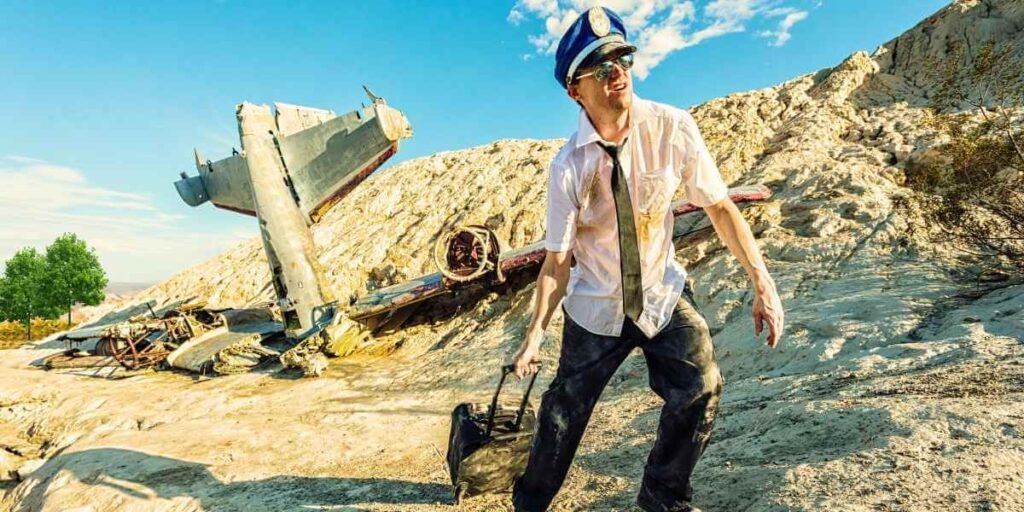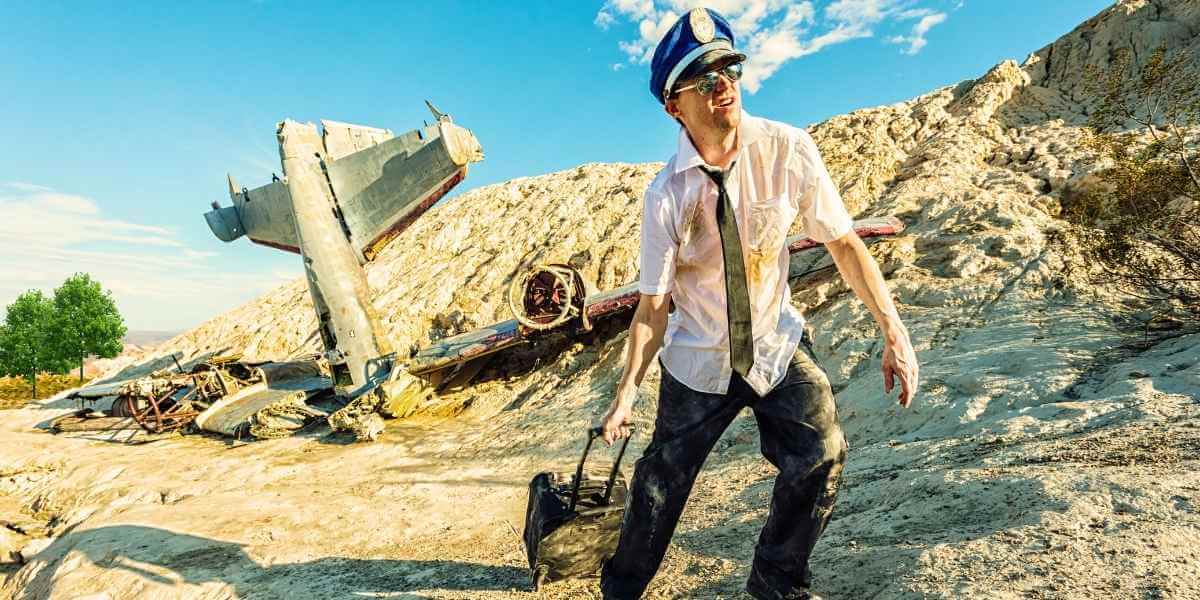In a crisis, a true survivor’s mindset is shaped by their ability to act decisively, rather than just talk about it. It’s not enough to simply be part of a group or rely on others; having a Proactive approach is essential. Today’s blog article will dive a little deeper into what it really means to develop this mentality.
The survivor’s focus on action starts with the understanding that to survive a violent encounter, one must first accept that they are in the situation. Training helps build this response, but it’s the will to keep going that makes the difference.
In my own experience, those who have the most success do not wait for others—they act swiftly, understanding that a true survivor embraces this mental shift as an important part of surviving.

What Defines a Survivor Personality?
A survivor has the ability to dig deep and find ways to cope with any form of adversity. What sets them apart is their remarkable resilient spirit and the flexibility they show when adjusting to distressing circumstances. Often, when times are tough and everything seems like it might fold, these personalities rise up, finding ways to turn things around.
They have a natural gift for surviving because they focus less on safety or security, and more on setting positive goals and keeping a mindset of growth. From my experience, these folks often seem to walk confidently into the unknown, expecting to make things work despite the chaos.
One thing a true survivor has learned, either through being taught or simply by going through life experiences, is that survival isn’t about a black and white choice or either/or thinking. Instead, it’s an extensive menu of behaviors to choose from depending on the situation.
These are practical thinkers, able to focus attention on the present rather than being weighed down by what might be lost. While not everyone likes the idea of losing everything, survivors believe no matter what happens, they can still move forward and handle their own destinies.
It’s this unshakeable foundation, built from their own beliefs and expectations, that allows them to turn a mad world into something they can manage—while the rest of us might still wonder how they do it.
List of Characteristics of a Survivor Personality
It is said that a wise man is one who learns from the mistakes of others or benefits from the experiences of others so that he can save his precious time to make the most of it. Let’s go and know that What are the characteristics of Survivor and how we can adopt them?
Self-Control and Awareness
A true survivor demonstrates self-possession by recognizing and owning their emotions, especially in stressful times. Emotional control is key to surviving life’s toughest moments. By controlling emotions like anger, they can avoid self-defeated behaviors such as angry outbursts that diminish their credibility and respect from others.
Instead of becoming churlish or inflexible, survivors find strength in adaptability and calm, preserving their energy and resources. They have a strong sense of place and purpose in life, understanding their value to society. By expressing gratitude and following their spiritual path, they maintain balance and find ways to celebrate their journey, no matter how difficult.
Belief and Conviction
A strong sense of faith in oneself, others, or a greater presence plays a crucial role in a survivor’s journey. It generates hope and drives motivation to not only endure but to survive well. Believing in future possibilities, even when uncertain, is what Vaclav Havel, former President of the Czech Republic, described as the conviction that things will turn out right, even if they don’t seem to make sense at the moment.
This assurance of good intentions and a purpose in life becomes essential when facing tragedies, allowing survivors to maintain the will to move forward and embrace a positive future, no matter how challenging the path ahead may be.
The Power of a Positive Mindset
Survivors do not allow their circumstances to determine their mood or attitude. They understand that life doesn’t always go as planned and do not depend on ideal conditions to feel content. Instead of being thrown into a tailspin every time something goes wrong, they choose to stay focused and look for solutions.
Whether the situation is good or bad, a person with a survivor’s mentality actively recognizes the positive aspects and takes steps that could lead to a better outcome. This attitude shapes how events play out in real life, as they understand that dwelling on challenges won’t help—taking action will.
For instance, imagine an active shooter situation in the workplace, where people panic upon realizing the building is in lockdown with an armed gunman inside. Some might immediately start texting goodbyes to their loved ones, assuming there’s no way out, but a survivor would focus on finding an escape route or barricading the door to ensure safety.
This kind of thinking is what Al Siebert, PhD, describes in his books like The Survivor Personality and The Resiliency Advantage, where he emphasizes that a positive attitude and mindset are crucial to well-being, especially in difficult circumstances.
Some people thrive in adversity, while others feel overwhelmed—the difference often lies in how they choose to think and act.
When adversity hits, survivors realize they might not control the situation, but they can control their thoughts. They understand they have a choice: to become a victim or a victor, and that depends on their attitude. Survivors develop everyday habits that strengthen their coping skills and increase their chances of survival if needed.
For example, if you regularly adhere to strict deadlines at work, you know that your focus and concentration increase as the deadline approaches. You can’t afford to get distracted and miss the deadline—just as a survivor knows they can’t lose focus in an emergency.

Adaptability: The Core of Survival
Survivors possess a remarkable ability to adapt to unexpected or undesirable situations. For instance, imagine someone operating heavy machinery that malfunctions, resulting in a severe injury like a leg wound. In such a crisis, the survivor’s first instinct isn’t to panic but to assess the realities of the situation. They might use a shirt as a makeshift tourniquet, buying time to call for help until EMS arrives.
Survivors are always aware of their surroundings, taking note of clues and scanning the environment to understand the complete picture. This awareness increases their chances of survival because they can quickly assess what is happening and make immediate decisions.
When faced with a crisis, survivors also know how to regulate their emotions. They understand that panic can interfere with logical thought, so they set aside emotional responses to evaluate the facts. This combination of curiosity, strategic problem-solving, and bravery helps them to face challenges head-on.
Rather than becoming overwhelmed, they proactively search for solutions. Survivors welcome change and understand that adaptability is essential to overcoming adversity. By focusing on practical steps, they avoid lingering in a depressed state and instead engage in activities that lead to positive outcomes.
In his book The Survivor Personality, Al Siebert highlights that flexibility is a key trait that helps individuals survive in extreme situations. Whether someone is optimistic or pessimistic, Type A or Type B, the ability to adjust is what sets survivors apart.
In fact, those with a mix of biphasic traits—meaning they can balance opposing qualities like being both extroverted and introverted—have a higher chance of surviving because they are more complex and adaptable. Their ability to switch between traits as needed makes them better equipped to deal with whatever life throws at them.
A survivor doesn’t just passively wait for things to improve. They are always acting strategically, choosing how to function and how to interact with the world around them. They know they can’t control everything, but they can control how they respond.
By continually seeking innovative answers and remaining brave in the face of difficulty, survivors develop the most important trait of all: the ability to handle life’s toughest moments and come out stronger on the other side.
Mental Toughness
Being mentally tough is essential for survivors, much like a first responder who stays calm and focused in life-or-death situations. It’s not an easy thing, and we’re often fooled by our own minds into thinking we can’t handle more than we actually can.
However, mentally tough people know their bodies are capable of much more than their minds tell them. Imagine applying a tourniquet or packing a wound—these are tasks that require immense mental toughness, and they reflect the mindset needed to survive. It’s about mastering the mind, not letting it master you.
Developing mental toughness doesn’t always happen in emergency situations. It can be built in simple ways, like saying no to a delicious donut when you’re craving it, or sticking with a tedious task until it’s complete. Seeking out discomfort, like taking a cold shower or going skydiving when you’re afraid of heights, can train the mind to handle challenges.
Even running a marathon or enduring a strenuous workout are activities that build strength, resilience, and endurance. These small actions prepare you mentally to respond with clarity and toughness when life throws its hardest challenges your way.

Empathy: A Survivor’s Hidden Strength
Empathy is a powerful motivator for survivors, fueling both growth and transformation. It allows them to understand the pain and suffering of others, helping them find solutions that not only benefit themselves but also alleviate the struggles of those around them. Survivors are often seen as resilient and adaptive, and a large part of this comes from their empathetic nature.
They recognize the importance of holding onto their humanity in even the darkest moments, which enables them to not only survive but thrive in adversity. Through this, they maintain hope and compassion, refusing to become hardened or detached from their own or others’ experiences.
A true survivor is someone who turns their experiences of hardship into positive action, becoming an advocate for others. Their empathy motivates them to share emotional support and build a unified group dynamic, which provides a sense of purpose and meaning.
Survivors understand the power of vulnerability, recognizing that sharing their fears, struggles, and emotions encourages others and helps create a grounded community. This sense of solidarity is especially important in isolating and hostile environments, where individuals might otherwise feel abandoned or overwhelmed.
By fostering connection, empathy strengthens bonds and motivates survivors to push through challenges together, forming a supportive group that thrives collectively.
In high-pressure survival situations, empathy is not just about feelings—it enhances intelligence and decision-making. Survivors are able to assess the state of the group, recognizing both needs and conflicts, and turning those into opportunities for cooperation.
This collaboration creates a supportive atmosphere that helps them navigate and endure difficult circumstances. In fact, the ability to understand and share the feelings of others is a crucial trait in the personalities of those who have emerged stronger from adversity.
By developing a heightened sensitivity and unique perspective, survivors learn to connect on a deeper level, which in turn fuels collective overcoming and fosters stronger relationships.
Ethics and a Talent for Serendipity
Survivors who have survived life-threatening or dangerous situations never say it was easy, but they often reflect on how their ethic played a crucial role in overcoming the odds. Their hard work and determination allow them to navigate different scenarios with a mindset that focuses on what needs to be done.
This point of ethic enables them to set their mind and put their head down to push through any challenge. The ability to turn obstacles into opportunities is key for survivors, as they often find that adversity pushes their lives in a better direction than they ever imagined.
This is where their talent for serendipity comes in—not as a result of pure good luck or a lucky accident, but from their resilience in transforming hardship into growth.
For highly resilient people, encountering a life-disruptive event becomes a gift. They uncover creativity and strengths they didn’t even know they had. These survivors are always looking for solutions, constantly on the hunt for new perspectives, and asking tough questions.
Instead of staying stuck, they explore different angles, understanding that change must be pursued to find success. In doing so, they see that while things remained the same for others, their ability to navigate life’s toughest moments with resilience allowed them to embrace serendipity and take their lives in directions they never expected.
This mindset, paired with their unwavering ethic, shows how survivors can transform the most difficult situations into opportunities for growth and success.

Troubleshooters
Survivors are often natural troubleshooters, capable of finding handy and creative solutions to even the most complex and difficult problems. They don’t wait around for things to fail; they anticipate challenges because they want and need things to work smoothly and easily. What makes them stand out is their ability to possess common sense and create synergy in their actions, which often serves as their primary motivation in life.
Survivors are not prone to complaining when something isn’t working well. Instead, they feel a strong urge to make improvements, seeking a goal of achieving a win-win situation. As Al Siebert mentions, one of the key skills survivors develop is to ask the right questions, interact with everyone involved, and gather input to find a positive solution. They don’t just solve problems; they convert obstacles into opportunities, which makes things better over time.
A powerful example of this can be seen in a soap manufacturing company, where a customer complaint about receiving an empty box highlighted a quality control issue. While the company’s engineers developed an elaborate scanning system to catch errors, one line worker came up with a simpler, more effective solution—placing a temporary fan along the production line that would blow away the empty boxes.
This perfectly illustrates how survivors apply their personal code of moral principles and ethical practices to solve problems with less complexity. Survivors recognize that by developing their nature to work smarter, not harder, they can accomplish more with less effort and better time management. Their ability to harness both energy and work efficiently is what allows them to thrive in problem-solving situations.
Leadership
Leadership is a natural ability for survivors, as they can draw people together and find commonality with others. Great leaders display genuine empathy and know how to leverage that to create win-win scenarios. They have excellent skills in communicating successfully with everyone, which makes them naturally attractive to people.
By investing in relationships, believing in others, and sharing knowledge, they foster trust and offer support when needed. Good leaders have a strong command of language and can express themselves in an articulate manner, drawing people in and connecting emotionally to inspire action.
Motivation
A survivor is a person who is driven and motivated to find the strength to survive in difficult situations. When circumstances look bleak, they choose positivity and adapt to unexpected challenges. It’s essential to train the mind to stay tough and maintain this mindset, especially when facing undesirable circumstances. They consider every accomplishment and success as worthwhile, even if it’s something small.
For them, family and relationships can be key sources of motivation, pushing them to work hard, no matter how long it takes. A survivor’s characteristics involve using all methods necessary to adapt and overcome challenging situations.

Playful Curiosity
Survivors have an innate curiosity that fuels their drive to explore and question the world around them. This sense of wonder is a powerful characteristic, especially in difficult times. Their inquisitive mindset allows them to find creative solutions when faced with challenges and obstacles that might leave others feeling overwhelmed or defeated.
I’ve seen firsthand how this openness to possibilities nurtures resilience in adversity. It is their willingness to step into the unknown and adapt to unpredictable environments that sets them apart. Instead of getting stuck or discouraged, they experiment with different strategies and approaches, embracing trial-and-error to keep moving forward.
This curiosity also helps survivors maintain a positive attitude during dire situations. They see setbacks as learning opportunities, rather than threats, and stay hopeful and engaged even when circumstances are uncertain.
I’ve noticed how their eagerness to learn and question things strengthens their motivation and confidence. In these tough times, they are not frustrated by things not going as planned; instead, they adjust their course, looking for ways to survive and thrive. This flexibility and adaptability foster growth and development, helping them flourish where others might falter.
Moreover, a survivor’s playful curiosity strengthens their relationships with others. By being curious about the world and actively listening to other viewpoints, they create deeper connections and build supportive networks.
Engaging with the community provides a lifeline during tough times. It’s remarkable how this openness sparks innovation and breakthroughs, as they take risks and explore unconventional paths to find inventive ways forward. Through this unique spirit, survivors are able to thrive even in the most dire situations.

Self-Love
Self-love is a key part of how survivors manage stress and stay emotionally strong. By practicing habitual self-care, both emotional and physical, they build the strength to face unexpected tragedy without letting it define their future. They accept their mistakes, learning to deal with self-disappointment and move forward without the burden of lingering self-incrimination.
From my experience, this genuine love for oneself not only helps maintain health but also prepares them to be more caring and empathetic toward others, creating invaluable, supportive bonds in their relationships.
Final Thoughts
the characteristics of a survivor extend far beyond mere resilience; they embody a proactive, adaptable, and empathetic mindset that transforms adversity into opportunity. A survivor’s ability to maintain self-awareness, emotional control, and unwavering belief in a positive outcome sets them apart in even the most daunting circumstances.
Their mental toughness, combined with playful curiosity and an innate drive to troubleshoot challenges, allows them to navigate life’s unpredictability with strength and creativity. Survivors are not defined by the hardships they face but by their determination to grow, adapt, and inspire others along the way.
These traits remind us that survival is as much about mindset as it is about action—offering a powerful blueprint for thriving, not just surviving.
